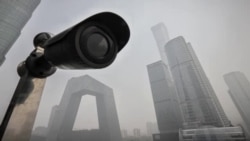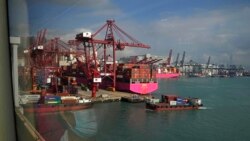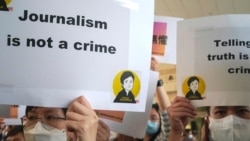On November 1, Chinese Foreign Ministry spokesperson Wang Wenbin was asked to comment on the decreasing number of U.S. companies with regional hubs in Hong Kong and whether Hong Kong’s sweeping National Security Law is causing reputational harm.
Census and Statistics Department data released on October 28 showed that 254 U.S. companies had regional headquarters in Hong Kong as of June – a 10% drop from 2020 and the lowest number since 2003, when 242 U.S. companies were there.
Wang said a January survey by the American Chamber of Commerce in Hong Kong showed “that in January 2021, a much larger proportion of companies are optimistic about the business environment in Hong Kong compared to August 2020.”
“Since the implementation of the Law on Safeguarding National Security in the Hong Kong SAR, U.S. and other foreign investors have enjoyed a safer, more stable and predictable business environment,” he said.
Trouble is, Wang misrepresented the survey, and the claim of a better business climate is false.
In fact, multiple American Chamber of Commerce surveys, including the one cited by Wang, showed that U.S. businesses are cautious about the risks in Hong Kong. The surveys also make clear that the National Security Law has been the driving force behind such caution.
In the chamber’s 2021 Business Outlook Survey, conducted at the start of the year, 40% of its 181 respondents said they expected the business environment “to remain unstable or worsen,” while a third of the respondents said Hong Kong had “become less competitive as an international business hub.”
Although pessimism about the business environment decreased in January compared to the chamber's August 2020 survey, it still remained high.
In that 2020 poll, which followed the new security law’s rollout, “75% reported feeling pessimistic about Hong Kong’s business prospects in general.” In the January 2021 poll, more than 61% of the respondents said they thought Hong Kong’s business environment was unstable and had worsened in the preceding 12 months.
“Many pointed out the protests, the National Security Law (NSL) and COVID disruptions as their main concerns,” the survey summarized. “Some say the way the NSL was implemented and the ambiguity of its provisions have caused significant uncertainties. Though protests have stopped, the NSL has destabilized HK’s legal framework, according to some companies.”
In a more recent chamber survey, conducted May 5-9 with 325 business members responding, 42% of the respondents said they were considering or planning to move away from Hong Kong, with “the most widely shared concern” being “discomfort due to the National Security Law.”
Beijing imposed the sweeping legislation in June 2020 and has since reduced the city’s overall freedoms and quashed free speech and independent news media.
The national security law criminalizes “secession,” “subversion,” “terrorism” and “collusion with foreign forces,” with punishment up to life imprisonment. Amnesty International said in July 2020 that the offenses were “dangerously vague and broad,” adding that “virtually anything could be deemed a threat to ‘national security’ under its provisions, and it can apply to anyone on the planet.”
Aside from targeting pro-democracy activists, politicians and lawyers in Hong Kong, the law poses a direct threat to foreign firms, legal experts say.
First, the law has broad extraterritorial reach. Under Articles 37 and 38, permanent and nonpermanent residents of Hong Kong and companies can be prosecuted for documents, work or activities outside Hong Kong deemed to “endanger” China’s national security.
“This could include receiving information about meetings if they fall within a key industry, purchasing documents that later become classified as state secrets, or hosting a website or server outside Hong Kong that contains content that violates the HK NSL,” wrote Dennis Kwok, former legislative councilor of Hong Kong, and Elizabeth Donkervoort, program director for East Asia at the American Bar Association, in July.
“Similarly, given the breadth of industries subject to national security concerns by the PRC [People’s Republic of China], disputed intellectual property claims over a piece of technology could amount to national security or state secrets,” their report stated.
Thomas Kellogg, executive director of Georgetown Center for Asian Law, co-wrote in Foreign Policy in July that Article 43 of the law is a key concern for private companies. That provision gives national security authorities in Hong Kong sweeping powers “to engage in search, seizure, freezing of assets, and online censorship of those accused of violating the law.”
As investigations and prosecutions in the name of national security intensify, the Hong Kong government could ask companies to turn over information about customers, to censor their online speech, or to freeze their bank accounts.
Moreover, rules for prosecuting Article 43 expanded the national security authorities’ investigative powers and slashed due process and privacy protections for the accused.
Article 43 has been put to use.
In January, Hong Kong police cited Article 43 to force the city’s major telecom provider, Hong Kong Broadband Network, to block access to HKChronicles, an anti-government website.
In May, Hong Kong police cited Article 43 to order an Israeli software company, Wix, which operated outside of Hong Kong, to disable a pro-democracy website linked to Nathan Law, a Hong Kong pro-democracy dissident and former legislator.
The company initially complied despite Law’s objections. Law, who took refuge in the UK, was told that the company was acting on police orders and could be prosecuted. The company eventually restored the website and apologized after Law shared the company’s response on Twitter.
Kellogg cautioned that the reputational cost would be significant for any company to assist Hong Kong government’s crackdown on rights.
On July 16, the U.S. departments of State, Treasury, Commerce, and Homeland Security jointly warned U.S. businesses in Hong Kong of the “potential reputational, regulatory, financial, and … legal risks associated with their Hong Kong operations.”
The advisory warned U.S. businesses in Hong Kong that they are subject to the security law, under which foreign nationals, including one U.S. citizen, have been arrested.








